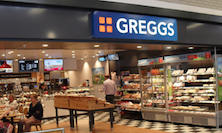Newcastle-based bakery and “food-on-the-go” retailer Greggs said its total sales were up 7.5% in first 19 weeks of 2017, compared to a 5.7% rise for the same period last year, helped by its £2 breakfast offer.
Greggs share edged higher to around 1,074p to give the firm a current stock market value of just more than £1 billion.
Company-managed shop like-for-like sales in the first 19 weeks were up 3.6%, compared to 3.7% for the same period of 2016.
“Customers increasingly recognise the quality and value of our £2 breakfast offer and we have invested further in capacity to meet this growing demand,” said Greggs.
“Balanced Choice sales continue to grow and we have added lines to this range, including cold-pressed juice drinks and a new selection of freshly-prepared salads and wraps incorporating flavours such as ‘Coconut, Lime and Chilli Chicken’.”
In the first 19 weeks of 2017, Greggs completed 87 shop refurbishments and opened 42 new shops, including 20 franchised units in transport locations.
Greggs closed 14 shops, giving a it total of 1,792 shops trading at May 13, comprising 1,615 company-managed shops and 177 franchised units.
“New shop openings remain focused on new food-on-the-go locations, the relocation of existing shops and new catchments such as Northern Ireland and the south west of England,” said Greggs.
“Our investment in new systems and process improvements continues apace.
“Central forecasting and replenishment is now operating in half of our shop estate, replacing the traditional ordering process.
“Initial signs are good — the system is popular with staff and is delivering improved product availability.
“We have also concluded the consultation process with staff affected by the planned consolidation of our manufacturing operations and now have a basis on which to commence the investment programme that will support further growth in shop numbers and improved quality and efficiency in manufacturing.”
In its outlook, Greggs said it had made a good start to 2017 “although the sales outlook remains uncertain in the context of slowing growth in disposable incomes.”
It said input cost inflation was having a “modest” impact on margins in the first half of the year as expected “however we have increasing visibility of costs for the second half and anticipate this pressure to ease towards the end of the year.”
“Whilst this pattern will constrain profit growth in the first half of the year we expect to make progress in line with our previous expectations for the year as a whole.”
